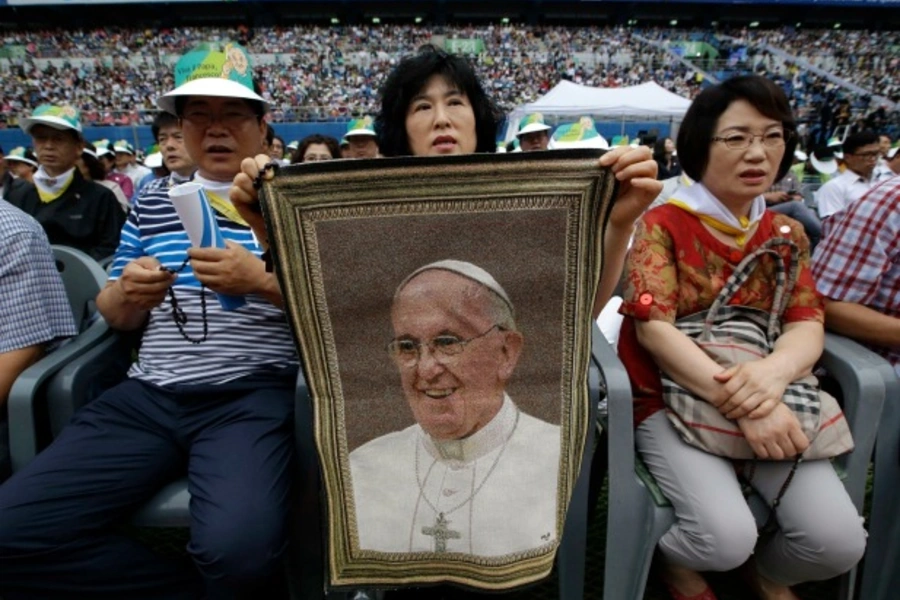Friday Asia Update: Top Five Stories for the Week of August 15, 2014

More on:
Ashlyn Anderson, Lauren Dickey, Darcie Draudt, Andrew Hill, Will Piekos, and Sharone Tobias look at the top stories in Asia today.
1. Pope Francis draws thousands on his first trip to Asia. Pope Francis visited South Korea this week, marking the first visit by a pope to Asia in fifteen years. Though the pope will not visit other countries in Asia, a spokesperson said that he is there “to address the entire continent, not just Korea,” and he will also travel to the Philippines and Sri Lanka next year. The Catholic Church is interested in expanding within Asia, but is banned in mainland China and North Korea. China recognizes a different Catholic church that answers to the Communist party rather than the Vatican. Approximately 10 percent of South Korea’s population is Catholic, and has been growing, while another 20 percent of the population is Protestant. North Korea fired five short-range rockets the same day the pope arrived in South Korea, though Pyongyang claims there is no connection with the pope’s visit.
2. Modi talks tough on Pakistan. On a visit to the town of Kargil in Indian-administered Kashmir, Indian prime minister Narendra Modi accused Pakistan of conducting a proxy war of terrorism against India in a speech to Indian troops. Since Modi’s inauguration, to which he invited the Pakistani prime minister to signal a new emphasis on regional ties, Indo-Pakistani relations have enjoyed a degree of optimism. However, recent ceasefire violations along the Line of Control have stirred animosity on both sides. In a statement on Wednesday, the spokesperson for Pakistan’s Ministry of Foreign Affairs called Modi’s accusation “baseless” and “unfortunate,” “especially as the leadership of Pakistan wishes to establish good neighborly relations with India.”
3. U.S. military takes first step in base relocation plan. On Thursday, Japan’s Ministry of Defense placed buoys off the coast of Okinawa in the first step of a long-planned and controversial relocation of U.S. Marine Corps Air Station Futenma. The buoys in Henoko Bay outline a temporary no-entry zone ahead of a geologic survey of the area where construction will begin on the new facility. Local protestors in kayaks attempted to intervene as a Japan Coast Guard cutter sat off shore. Initial plans to relocate U.S. marines to the area were agreed to in 1996, but many Henoko residents are strongly opposed to the new facility which could endanger a coral reef and the dugong, a Japanese species of manatee. The Japanese and U.S. governments say the new base is needed to alleviate danger and noise caused by the over-crowded base at Futenma, located in the heart of sprawling Ginowan City.
4. Japan protests Russian military drills in disputed territory. The Russian military began exercises this week at a northern Pacific island chain claimed by both Japan and Russia. Japan’s foreign ministry lodged a “strong protest” with the Russian embassy, and Japanese prime minister Shinzo Abe called the exercises “totally unacceptable.” Tokyo has sought deeper cooperation with its northern neighbor, both to gain access energy resources and in the hopes of resolving the islands dispute, and in his first year in office Abe met with Russian president Vladimir Putin five times.
5. North Korean escapees detained on China-Laos border. Eleven North Koreans were detained by Chinese officials earlier this week. The North Koreans, in their 20s and 30s and mostly women, left North Korea’s Ryanggang Province last Thursday and traveled south through China in a minivan. They were detained by Chinese border guards at a checkpoint on the Laotian border as they attempted to cross on foot. China does not recognize North Koreans leaving their home nation without permission as refugees, and any North Koreans seeking refuge face forced repatriation and possibly imprisonment or execution.
Bonus: world’s first surviving panda triplets born. The Chimelong Safari Park in Guangzhou, China, announced Tuesday that a set of panda triplets was born on July 29. Citing advances in panda-breeding technology, experts have called their birth and survival a “miracle.” Photos show the three unnamed cubs in their incubator; the mother, Ju Xiao, is also healthy thanks to an exercise regime in the months leading up to their birth.
More on:
 Online Store
Online Store